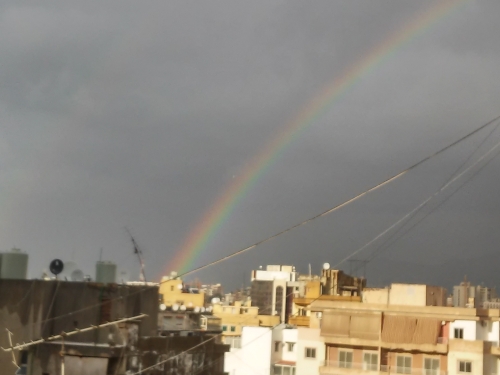
I imagine myself going into a gift shop, where I ask the young man standing behind the counter to help me choose a gift for valentine’s day. He asks me while smiling: "for a husband or a boyfriend?” I imagine myself correcting him with a very serious face and an assertive tone “neither, for my girlfriend. I’m a Lesbian.” I can see that his face is yellow now. I can see that as he sits on the chair behind his counter, he is obviously having a panic attack, he is trying to speak, his panic is shifting quickly to anger, but the kind of anger that your father has when you tell him that you’re not going to become a teacher but a freedom fighter, the anger that cripples because they (my father, and the imaginary guy behind the counter in my imaginary scenario) realize that you have so much power they can’t do anything about that. I imagine myself leaving the shop, calling my girlfriend, telling her about what I just did and laughing about it, because in my imaginary scenario, my girlfriend doesn’t really care about valentine, she actually wants to ruin it- not because being in a queer relationship in Beirut isn’t exactly an acceptable and visible moment, and when it is and in case it became visible, you make sure that you put it back in the closet so to speak- but because we both know how small the city is, and how homophobia, misogyny and the lesbian fetish exist even amongst the safest and most radical imaginary communities. She, as a feminist, holds her ground; we both have a great deal of animosity towards a fake capitalist day that only pushes for the consumption of love.
The scenario above isn’t about anger or about feeling excluded from the valentine party taking Beirut by storm every year. It also isn’t about empowering myself to face homophobia on a particular day that glorifies very particular heteronormative ways of being and existing on planet earth. My imaginary scenario only indicates how awesome my imaginary girlfriend is, how unsafe things are, and how annoying it is to be a queer woman and in love in Beirut. I remember there was a time, in Beirut, where I wanted my love to be recognized, because I wanted it to be legitimate so to speak; I wanted to hold hands down the street, and to be able to be publicly happy about being in love. Yet somehow, these public gestures have paved the way to experiencing some really awkward and unpleasant moments. I remember once in a sit-in for Syria, a Lebanese guy that I knew from political activities approached me and tried to open a conversation, where he wanted to know what exactly happens in bed between two women. Needless to say, I walked from that conversation to the furthest point in the sit-in and away from him, hoping that the Syrian Regime thugs show up and beat him. They didn’t show up.
I often find myself wondering about people on this day, about their excitement on Valentine, the shopping, the gifts and the many discounts (straight) couples are showered with. I wonder where their excitement comes from exactly, and how is their love practiced anyway? How does it co-exist in the same household with a migrant domestic worker? How does it coexist with sectarianism? How does love work, if you have no choice but to love from a specific opposite gender, and specific sect, and someone who is preferably rich? I just have a feeling that this day symbolizes the hypocrisy we live in, in such a tiny space of land, where hate grows naturally against anything and everyone, and each other.
We must ruin valentine for tomorrow, we must remember that it symbolizes all the wrong things about love. Also, and after much thought, I don’t believe what I used to, that love is all you need. Love is not all that we need. The misogynist colleague at your office needs more than that. Your racist brother needs to stop being racist. The partner that keeps cheating on you must be held accountable. The friend who keeps betraying your friendship needs to self-explode.
BECAUSE Love is not what all these people and many others need. They need feminism- the radical one that breaks and rebuilds something new.
.
Publisher:
Section:






